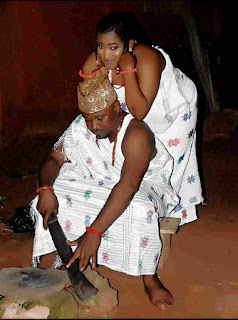Omu Anioma All White Funeral Event: 12 Things to Know About Anioma's Akwa-Ocha
- Emeka Esogbue
Following the recent press release by the burial committee of the late HRM Obi Martha Dunkwu that guests and dignitaries wishing to attend the funeral ceremonies of the late Omu of Okpanam/Anioma dress in all white including the people's Akwa-Ocha, the arena will be coloured in white in honour of the Anioma Amazon who many never had the opportunity of seeing in any attire other than the Akwa-Ocha.
The 21-man Hon Barr Bridget Anyafulu and Dr. Afamefuna Dunkwu-Okafor-led Committee understood that the Omu of Anioma stood for purity and the wish of the late Nneoha is to be honoured in sparkling white attire.
"It is an all-white program," the Committee with its membership drawn from different Anioma communities says.
What Do You Know About the Akwa-Ocha?
1. Akwa-Ocha is a popular hand-woven fabric typical to the Anioma people of Nigeria.
2. The fabric is though designed for all-purpose events, it can be customized to fit some particular events. This is the beauty of the fabric.
3. According to Bolatito Puddicombe of the African Textile Directory, the Akwa-Ocha may also be embellished with motifs and symbols to reflect the religious and traditional beliefs of the Anioma people. These motifs may be spiritual or traditional symbols of animals, plants, cosmological symbols, and other man-made objects.
4. Akwa-Ocha is not in use anywhere except in Anioma and is quite different from the Akwuete of the Eastern Igbo or Aso-Oke of the Yorubas. It is uniquely owned by the Anioma people.
5. Akwa-Ocha is one of the civilizations of the Anioma people over the centuries
6. For the Enuani people of Anioma, Akwa-Ocha is beyond fashion as it also serves ritual significance. To borrow the words of Bolatito, Akwa-Ocha "inspires certain mystic essence in ceremonies and rituals" of the Enuani people. This explains the reason no burial is complete among the people without the use of the Akwa-Ocha. As an aspect of 'Itu uni" rites, the dead may be accompanied by Akwa-Ocha in their journey to the world beyond. The symbol of elderliness is also the ownership of the Akwa-Ocha. Hence, aged Enuani men and women are always seen in Akwa-Ocha. The Obis and Omus are always expected to wear the fabric either as a dress or mbulukwu (male skirts).
7. Although the commonest name of the fabric is "Akwa-Ocha," it enjoys other names. In Ibusa, it is also known as "Otogwu" and in Onicha-Olona, "Ogbeyi-Akpani." The latter is derived from the high cost or value of the fabric in those days. Ogbeyi Akpani thus implies, "the untouchable by the poor in the society." It is important to state that at the time of the old, not everyone was capable of owning one because it was extremely expensive. Today, many may also consider it expensive to purchase.
8. To appear in Akwa-Ocha is to showcase oneself as a proud Anioma person from Enuani. The period of electoral campaigns is the period when campaign billboards are filled with aspirants adorned in Akwa-Ocha. Akwa-Ocha is an ethnic statement.
9. There are many scenes that anyone may witness very many audiences in Akwa-Ocha attire such as funeral rites, festivals, weddings, and Anioma fashion shows but the Anioma Cultural Festival, an annual event of the Organization For the Advancement is the largest gatherer of Akwa-Ocha wearers from different parts of the world.
10. The Akwa-Ocha is mostly worn as a mode of identity hence, the wearer is likely from Anioma.
11. The men may tie it around their waist, wear it as a flowing skirt, make it a complete native top and trousers, or use it as a muffler while the women can wear it as a wrapper with a blouse or tie it above their breasts.
12. For sure, Akwa-Ocha is not an everyday wear.
Now, that the Omu Martha Burial Committee wishes guests and dignitaries to dress in Akwa-Ocha or simply white to the passage ceremonies of the late Omu, Akwa-Ocha, the people's traditional attire will be showcased in Okpanam, the community of Utchi.
Burial Date: 24th to April 27th, 2024.
Picture Credit:
Akwa-Ocha Anioma Attire, a Facebook group

Comments
Post a Comment